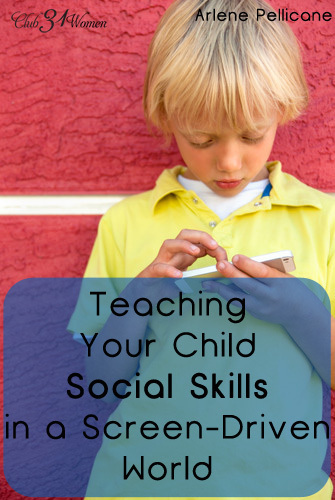Teaching Your Child Social Skills in a Screen-Driven World {& Giveaway}
*A special guest post by Arlene Pellicane, co-author with Gary Chapman (The Five Love Languages) of the newly released Growing Up Social: Raising Relational Kids in a Screen-Driven World.
You know the scene: one child is playing video games on a tablet while an older sister is texting away, never looking up from her screen.
The mom tries to have a conversation but can’t compete with the screens.
Although social media implies being “social,” we know that many kids are growing up with a lack of true people skills. When we overuse screens, we underuse relational skills.
What can you do to teach your child to care of others and to be truly social in a screen-driven world?
Practice, Practice, Practice
When it comes to learning a new skill like hitting a baseball or playing the piano, you know the saying “Practice makes perfect.” The role of practice is just as important when learning positive social skills. Consider your home as the dress rehearsal. It’s a safe place where your kids can role play and practice making conversation for common social settings they will experience in real life.
Begin by explaining how your child will benefit from acting friendly even when he would rather play a video game. Some benefits may be having more fun, making good friends, or enjoying school and social activities more. Share how becoming friendly has helped you in your life.
Here are a few social scenarios to practice at home with your child:
Successful play dates. Pretend you are a friend coming over to play. “What should we play?” you ask. Have your child pick five fun activities to choose from (things like board games, Legos, soccer or basketball). Make screens off limits and be sure to serve an extra delicious snack.
Playground fun. Go outside and pretend you are at your child’s school playground or a neighborhood playground. Ask your child, “What do you do when you first get to the playground?” Suggest that he or she look out for anyone who is standing alone. How might your child go about joining a group that’s playing? What if they say there’s no room? Run through different scenarios and how your child can respond. Role play situations to help your child practice interacting with classmates or neighborhood kids.
Navigating the classroom. Have your child sit at a table as you pretend to be the teacher. Ask a question and have your child raise his or her hand and tell you the answer. Stress the importance of making eye contact with his teacher. If your child has to present something to the whole class, practice many times at home in front of sibling or stuffed animals.
Meeting adults. You can make this activity more fun by putting on a costume like a hat or jacket. Practice the introduction as you pretend to be the new adult. “Joy, this is Mrs. Davis.” Have your child look you in the eyes and say, “It’s nice to meet you Mrs. Davis.” Go one step further and teach your child to ask the new acquaintance a question like, “How are you today?” or “What do you do for your job?”
Giving and receiving compliments. Pretend to be a friend, coach, or teacher and give your child a compliment like “You did a very good job on your drawing.” Have your child practice looking you in the eyes and saying, “Thank you.” Encourage your child not to mumble his thank you, but to say it clearly and enthusiastically. Then have your child practice giving a compliment to you. Challenge your child to compliment one person that day and report back to you on how it goes.
Reading non-verbals. Successful communication consists of both words and non-verbal cues. Screens can’t teach a child the nuances of body language or facial expressions. But you can act out different facial expressions to quiz your child. As you make different faces (sad, angry, happy, etc.), ask your child to name the feeling. You can thumb through a magazine together and identify the different emotions the people pictured are displaying. What might they be feeling by the way they look? What does their body language tell you?
As you teach your child social skills, keep Romans 12:10 in mind: “Be devoted to one another in love. Honor one another above yourselves.”
This is the why behind your training.
When you help your child prioritize people above screens, you are preparing him or her to thrive with many healthy relationships. No app can do that – but you can!
*Adapted from Growing Up Social: Raising Relational Kids in a Screen-Driven World by Arlene Pellicane and Gary Chapman.
GIVEAWAY: Growing Up Social: Raising Relational Kids in a Screen-Driven World
I n this digital age, children are spending more and more time interacting with a screen rather than a parent. Technology has the potential to add value to our families, but it can also erode a sense of togetherness and hinder a child’s emotional growth.
n this digital age, children are spending more and more time interacting with a screen rather than a parent. Technology has the potential to add value to our families, but it can also erode a sense of togetherness and hinder a child’s emotional growth.
In Growing Up Social: Raising Relational Kids in a Screen-Driven World, you’ll learn how to take back your home from an over-dependence on screens. Discover the five A+ skills needed to give your child the relational edge in a screen-driven world: affection, appreciation, anger management, apology, and attention.
Today’s screens aren’t just in our living rooms; they are in our pockets. Now is the time to equip your child to live with screen time, not for screen time. Constant entertainment is not the goal of childhood. No phone, tablet, or gaming device can teach your child how to have healthy relationships; only you can.
You can purchase a copy (in paperback or Kindle) of Growing Up Social HERE
I’m also happy to be giving away 2 copies of Growing Up Social!
a Rafflecopter giveaway Arlene Pellicane is a speaker and author of 31 Days to Becoming a Happy Wife. She has been featured on the Today Show, Family Life Today, K-LOVE, and The Better Show. She lives in San Diego with her husband James and three children. Visit Arlene at www.ArlenePellicane.com for free family resources including a monthly Happy Home podcast.
Arlene Pellicane is a speaker and author of 31 Days to Becoming a Happy Wife. She has been featured on the Today Show, Family Life Today, K-LOVE, and The Better Show. She lives in San Diego with her husband James and three children. Visit Arlene at www.ArlenePellicane.com for free family resources including a monthly Happy Home podcast.
(This post may contain affiliate links. Read my full disclosure.)
*If you would like these posts delivered directly to your inbox, simply subscribe below (and get the FREE eBook, The 7 Habits of a Highly Fulfilling Marriage).
The post Teaching Your Child Social Skills in a Screen-Driven World {& Giveaway} appeared first on Club 31 Women.





